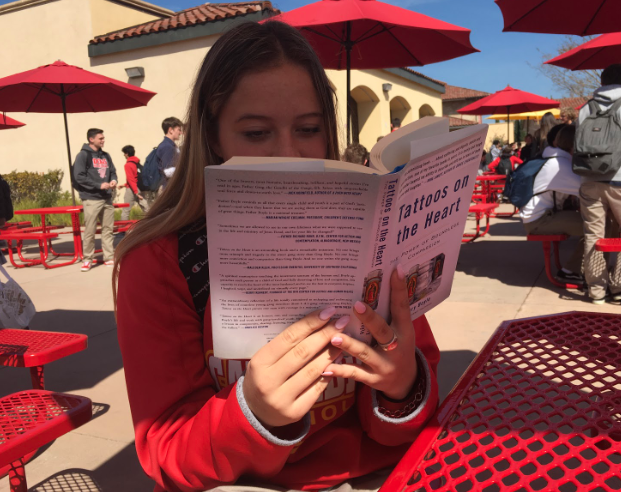Deficit in reading
Reading about ex-gang members turning their lives around in Gregory Boyle’s Tattoos on the Heart, Maile Spence ‘19 exposes herself to the lives of people very different from her own.
After being held back in kindergarten because of her subpar reading skills, Cathedral Catholic High School student Katherine Stevenson ‘19 never imagined reading would shape her as a person.
However, after entering a reading competition in elementary school, Stevenson’s stance on reading quickly changed.
“I discovered my passion for reading and learning, which not only helped me win the competition, but become a lifelong reader,” Stevenson said.
During the past decade, American teenagers have experienced a decline in reading interest due to quicker and more accessible forms of entertainment and a general disinterest in the written word.
However, people do not realize the social, academic, and psychological benefits of reading.
According to a recent El Cid poll conducted via Instagram, 55 percent of CCHS students do not read for fun. An average of 20 percent of American teenagers read for fun, while an estimated 80 percent spend time on social media every day, according to the American Psychological Association.
How is it that teenagers read less when every high schooler takes English classes that require them to read?
While literature still remains prevalent in schools, social media, television shows, and other forms of entertainment have replaced reading as people’s main pastimes, stifling imagination and independence of thought.
“In the past couple years as an English teacher, I’ve definitely heard the phrase ‘I don’t like reading’ more and more,” CCHS English teacher Ms. Kelsie Layana said.
Additionally, students who enjoyed reading as children now label it as another homework assignment, with a teacher’s pressure on them to read decreasing their motivation to do so.
Seeing reading as a chore decreases the intrinsic, or natural pleasure, of reading in a student’s mind. To increase reading interest, students need more control over what they read.
The benefits of reading take place even before the ability to read is gained.
Parents who read to their unborn children in the fifth month of gestation help wire that child’s temporal lobe for language and accurate grammatics, according to CCHS psychology teacher Mr. Francis Caro.
“Reading grammatically correct books to children helps wire the neurons for accurate speech,” Mr. Caro said. “Once a child learns to read, they gain access to education. They bring in new information and expand their vocabulary.”
Progressing into adolescence, people who read often develop a greater independence of thought than someone who does not. Researching historical and contemporary topics, especially looking at primary resources, helps build analytical skills and the ability to draw inferences. The act of intentionally seeking out information leads to an added level of interest, giving more opportunities for learning, Mr. Caro said.
“Reading is more than entertainment,” Mr. Caro said. “It is the access to education.”
Stories have been used to entertain existential questions and to build societies since the beginning of human civilization.
Movies, TV shows, and other forms of on-screen entertainment are someone else’s interpretation of a story. Reading allows one to create his or her own world, owing more to details and personal experiences that shape a reader’s interpretation of a story.
To circumvent the apparent lack of reading interest, CCHS English teacher Ms. Sara DeSantis chooses books she feels her students will relate to, and assigns corresponding activities she feels students will enjoy doing.
One of her English classes is currently reading Purple Hibiscus by Chimanda Ngozi Adichie, a story about a 15-year-old Nigerian girl that Ms. DeSantis hopes will spark empathy and intrigue within her students.
“I like to pick books about teenagers and issues my students might be dealing with,” Ms. DeSantis said. “To help raise their interest, I assign assignments like creating Instagram profiles for characters or making comic strips about events that happened in the novel.
“I hope they apply this exposure to their real life by understanding different people.”
Finding a genre or series that appeals to each individual will help increase reading interest. Reading should not be a chore, but an activity people look forward to because of its desirable results.
“Your literary skills, your vocabulary, and your own person will grow as a result [of reading],” Stevenson said. “If there weren’t any benefits to reading, then how could it have persisted for so many centuries?”

After an exciting year as the Photo and News Editor for El Cid, I will lead the new Entertainment section as the editor. I look forward to learning even...






















































